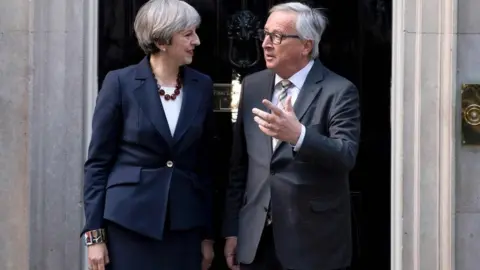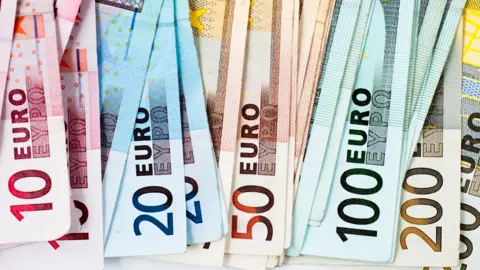No Brexit unless we back Theresa May, Jeremy Hunt says
 AFP/Getty
AFP/GettyThere will be no Brexit at all unless Theresa May is supported, a cabinet minister has warned.
Health Secretary Jeremy Hunt said it was not about a choice between "this Brexit and that Brexit".
He was speaking as leading Brexit campaigners issued demands for Mrs May before agreeing any payments to the EU, including ending the European court's jurisdiction the moment the UK leaves.
The UK voted for Brexit last year and is due to leave in March 2019.
But negotiations between the EU and the UK have not yet reached a breakthrough.
Mr Hunt's remark, in an ITV interview, came as he defended the PM and sought to reassure critics that UK courts would be supreme after Brexit.
He added: "I think there's an even bigger point here, that the choice we face now is not between this Brexit and that Brexit; if we don't back Theresa May we will have no Brexit - and she is doing an unbelievably challenging job amazingly well."
Mrs May is due to travel to Brussels on Monday for talks with European Commission president Jean-Claude Juncker, hoping the EU will agree that "sufficient progress" has been made so far to begin trade talks.
The BBC's Katya Adler says the mood in Brussels is positive, with diplomats working through the night to get details right.
Our Europe editor said the status of the Irish border remains an "outstanding issue" but there was "cautious optimism" that enough progress has been made to widen the discussions.
Allow X content?
Allow X content?
Allow X content?
What's happening with the negotiations?
 Getty Images
Getty ImagesThe talks so far have focused on what happens to citizens' rights after Brexit, the amount of money the UK will pay, and the future of the Irish border.
On the "divorce bill", the UK is understood to have recently increased its offer, which could be worth up to 50bn euros (£44bn).
There has also been lots of focus on the Ireland question in recent weeks, with the Irish government seeking more information on the "frictionless border" the UK wants to establish so customs checks are not needed.
The EU will only move on to talk about future issues like trade when "sufficient progress" has been made on these subjects - and is due to decide whether this has happened at a summit on 14 and 15 December.
What is Leave Means Leave?
The campaign group describes itself as the "campaign for a clean Brexit".
Signatories of its letter to the prime minister include former Tory cabinet ministers Owen Paterson, John Redwood and Lord Lawson and ex-Brexit minister David Jones.
Backbench MPs Jacob Rees-Mogg (Conservative) and Labour's Graham Stringer have signed it, as have several economists and business leaders.
Former Conservative leader Lord Howard - who hasn't signed the letter - told the BBC's Sunday Politics he shared the "aspirations" it contains.
What they want
The letter says the EU has not matched the "patience and goodwill" Theresa May has shown so far, and says the UK should make no "further financial commitment" until it agrees to certain conditions.
From March 2019, they say:
- There should be an "in principle" agreement for a free trade deal to be in place
- The current free movement of EU citizens into the UK should end
- No new EU regulations should apply in the UK
- The European Court of Justice should "cease to have any jurisdiction whatsoever" in the UK
Speaking on the BBC's Andrew Marr Show, Mr Rees-Mogg said if the UK remains subject to European court rulings after March 2019 "we will have stayed in the European Union".
What the government says
Theresa May has promised that Brexit will end the jurisdiction of the European Court of Justice in the UK.
But she has suggested its remit might continue during an "implementation period" after March 2019, which would not satisfy the Leave Means Leave demands.
On immigration, ministers have said free movement must end with the UK's EU membership but have promised businesses a "cliff edge" will be avoided in terms of employing foreign workers.
Meanwhile, there have been more warnings on the subject of the EU court from former Court of Appeal judge Sir Richard Aitkens and ex-Conservative leader Iain Duncan Smith.
The Sunday Telegraph reports that Sir Richard, the president of the Lawyers for Britain group, has written to Mrs May saying that giving the ECJ the exclusive jurisdiction over EU citizens' rights would be "tantamount to reversing the result of the 2016 referendum".
Speaking to BBC News, Mr Duncan Smith said that while the UK's courts would be able to take into account the European Court of Justice's decisions, it would be "unacceptable" for them to be bound by those decisions.
